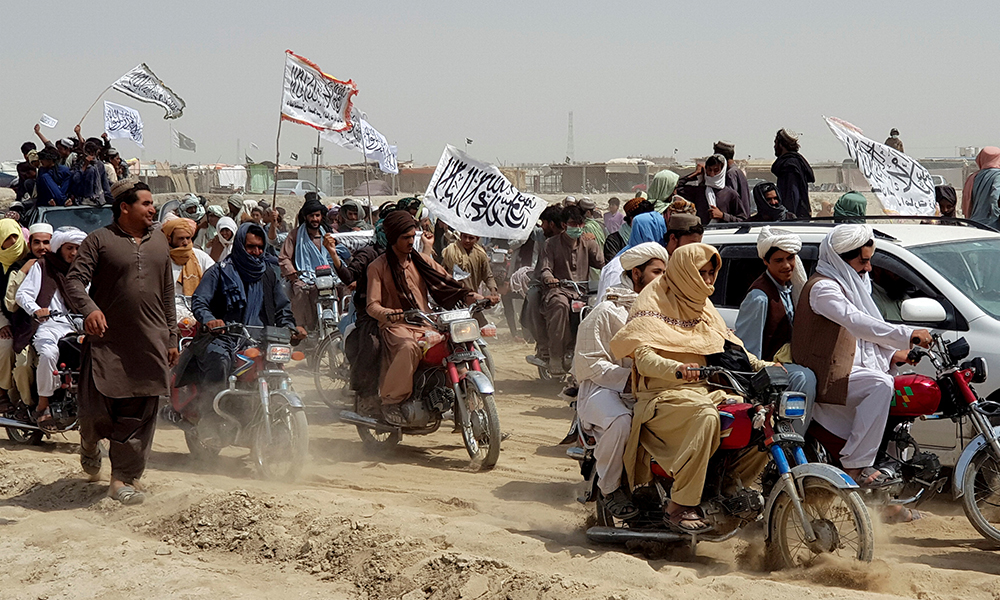U.S. ‘deeply troubled’ by attacks on civilians as Taliban sweep across Afghanistan

The United States said on Wednesday it was deeply troubled by reports of escalating attacks on civilians as the Taliban sweep across Afghanistan and Washington pulls out its last remaining troops and ends its longest war.
Secretary of State Antony Blinken, on a visit to India, said the only path to peace in Afghanistan was through negotiations, which all parties must take seriously.
Taliban insurgents have captured districts across Afghanistan and seized vital border control points in recent weeks, as Washington withdraws its last troops after 20 years. The Pentagon now estimates that the fighters control more than half of Afghanistan’s district centres.
The surge has raised the prospect that the militants could return to power. Millions of people fled their extreme violence during their last period of rule from 1996-2001, when they staged public executions of their foes, banned women from work and education and hosted Osama bin Laden’s al Qaeda network.
The Taliban say they will treat civilians well if they return to power, and will not allow the country to be used as a base for international terrorism.
Describing reports of attacks on civilians as “deeply, deeply troubling”, Blinken said: “An Afghanistan that commits atrocities against its own people would become a pariah state.
“There’s only one path, and that’s at the negotiating table, to resolve the conflict peacefully.”
The United Nations reported this week that civilian casualties had been surging in recent weeks, with as many killed in May-June as in the previous four months. The report did not cover casualties in July, when fighting has intensified further.
Afghans in government-held areas have been alarmed by domestic media reports in recent days of abductions and killings of civilians in areas where the Taliban have advanced. The Taliban deny they are carrying out revenge killings.
U.S. President Joe Biden has ordered all U.S. troops out of the country, fulfilling a policy pledge made by his predecessor Donald Trump, despite warnings from American generals of the potential for renewed civil war without foreign troops to protect the Kabul government.
Peace talks between the government and the Taliban in Qatar have largely stalled, with the Taliban showing little interest in negotiating while they are gaining on the battlefield.
CHINA HOSTS TALIBAN DELEGATION
Taliban delegations have visited neighbouring countries in recent weeks, gaining international standing for a movement that had been treated as outcasts and banned as terrorists for most of the past two decades.
The latest regional power to host them was China, whose Foreign Minister Wang Yi met a nine-person delegation led by Taliban deputy leader Mullah Baradar Akhund in the northern Chinese city of Tianjin during a two-day visit.
Wang said the Taliban were expected to “play an important role in the process of peaceful reconciliation and reconstruction in Afghanistan”, according to a readout of the meeting from the Chinese Foreign Ministry.
Taliban delegations have also visited Iran and Russia in recent weeks. The group has an office in Qatar.
“Politics, economy and issues related to the security of both countries and the current situation of Afghanistan and the peace process were discussed in the meetings,” Taliban spokesperson Mohammed Naeem tweeted about the China visit.
“(The) delegation assured China that they will not allow anyone to use Afghan soil against China,” Naeem said. “China also reiterated its commitment of continuation of their assistance with Afghans and said they will not interfere in Afghanistan’s issues but will help to solve the problems and restoration of peace in the country.”
Moscow, which fought for a decade in Afghanistan in the 1980s, said it was beefing up the combat capabilities at its military base in Tajikistan, a small former Soviet republic that borders Afghanistan.
Russian Defence Minister Sergei Shoigu, visiting Tajikistan on Wednesday, said the security situation had rapidly deteriorated in Afghanistan during a “hasty” U.S. withdrawal.
Shoigu said Islamic State fighters were moving into Afghanistan from countries including Syria and Libya, describing their arrival as “quite seriously organised”.
“We are paying increased attention to strengthening the combat capabilities of our base and refining plans to jointly repel possible insurgent infiltration,” he said.
A senior Russian diplomat has said Moscow views Taliban gains in northern Afghanistan as having a security upside because the group is hostile to what Russia regards as more dangerous Islamist extremists.
Russia is set to hold military drills on Aug. 5-10 near Tajikistan’s Afghan border, involving more than 1,000 Russian soldiers as well as Uzbek and Tajik forces.
